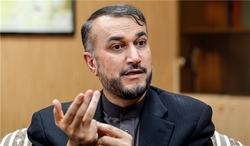 Advisor to the Iranian Parliament Speaker Hossein Amir Abdollahian, in a post on his Twitter page, reminded the Bahraini Foreign Minister Khalid bin Ahmed al Khalifa that the monarchy must listen to its people and stop being puppeteered by Tel Aviv and pro-Zionists.
Advisor to the Iranian Parliament Speaker Hossein Amir Abdollahian, in a post on his Twitter page, reminded the Bahraini Foreign Minister Khalid bin Ahmed al Khalifa that the monarchy must listen to its people and stop being puppeteered by Tel Aviv and pro-Zionists. RNA - In a tweet on Friday, Amir Abdollahian lashed out at Khalid bin Ahmed al Khalifa for executing dictated Israeli policies in the region.
Reconcile with your people and don't execute dirty policies of others in the region. Otherwise, Al Khalifa will fall as the “Deal of the Century” ceases to be valid. Zionists have no place in the future of the region, the former deputy foreign minister reiterated.
Earlier on Sunday, Bahrain’s main Shia opposition group, al-Wefaq National Islamic Society, lashed out at the country’s foreign minister for urging open communication with the Tel Aviv regime, dismissing his remarks as “reckless".
“This hysteric rush towards the Zionists reflects the (Manama) regime’s tendency to throw itself into the Israeli lap,” Wefaq said in a statement, adding that Al Khalifah’s remarks were “totally rejected".
The statement announced that such comments “are unprecedented impudence” by the Bahraini regime, as they reflect the gap between the “oppressive” ruling dynasty and Bahraini people.
Wefaq further highlighted that the Bahraini nation views Israel as an occupying regime, stressing that ordinary Bahrainis can’t be complicit in giving the Tel Aviv regime a chance to woo Bahrain.
“Israelis who were allowed to tour Bahrain were backed by the regime’s security forces,” the Bahraini opposition group stated, noting that any protest against the Israelis’ visit to the kingdom was banned by force.
Meanwhile, the Popular Front for the Liberation of Palestine (PFLP) said in a statement that Al Khalifah’s remarks and his allegation that Israel was part of the Middle East region's heritage constituted "clear treachery", and proved that the Bahraini regime was deeply involved in supporting plans to wipe out the Palestinian cause.
“This position contradicts the position of the brotherly people of Bahrain," the PFLP noted, adding that Bahraini people were "one of the strongest advocates of the Palestinian cause and Arab rights."
The PFLP also hailed the Bahraini people's rejection of their country hosting a US-sponsored economic workshop on the Israeli-Palestinian conflict.
Speaking in an interview with English-language The Times of Israel daily newspaper on the sidelines of the US-led economic workshop in Manama on June 26, the top Bahraini diplomat recognized Israel’s “right to existence”, saying the regime was “there to stay, of course”.
“Who did we offer peace to [with] the [Arab] Peace Initiative? We offered it to … Israel…. We want better relations with it, and we want peace with it,” Khalifah added.
He pointed to the Arab Peace Initiative as the blueprint for normalization of diplomatic relations with Israel, terming the Tel Aviv regime’s rejection of the plan as a “missed opportunity”.
According to Fars News Agancy, the Arab Peace Initiative, proposed by Saudi Arabia in 2002, calls on Israel to agree to a two-state solution along the 1967 lines and a “just” solution to the Palestinian refugee issue. The initiative has been repeatedly endorsed by the Arab League in 2002, 2007, and 2017.
The Bahraini foreign minister further encouraged Israel to approach Arab leaders about issues of concern regarding the proposal.
“Come and talk to us. Talk to us about it. Say, guys, you have a good initiative, but we have one thing that worries us,” he stated.
The so-called Peace to Prosperity workshop opened in Bahrain on June 25 and ran through June 26.
It apparently sought to advance the economic aspects of President Donald Trump’s controversial proposal for “peace” between the Israeli regime and Palestinians, dubbed “Deal of the Century”.
The Palestinian leadership boycotted the meeting, leading critics to question the credibility of the event.
847/940